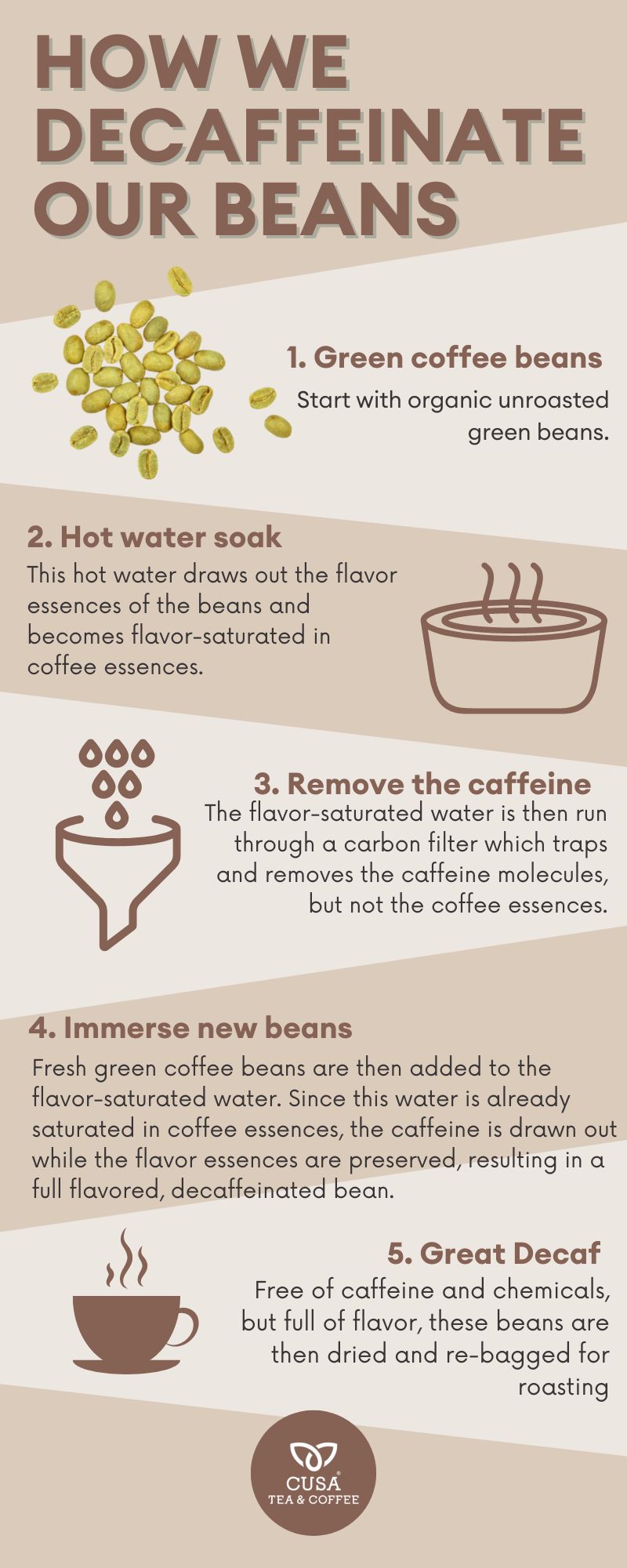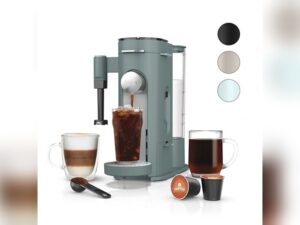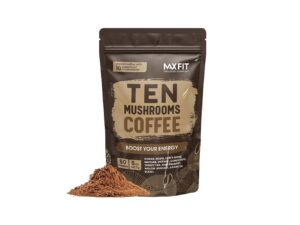Decaf coffee is coffee with most of its caffeine removed. Learn What is Decaf Coffee and how it offers the rich taste of coffee without the full caffeine kick.
Are you curious about decaf coffee? This type of coffee undergoes a process to remove most of the caffeine content, making it a great choice for those sensitive to caffeine or looking to cut down their intake. Many enjoy it for its milder effects on the body while still savoring the rich flavors.
Whether you’re a coffee lover or just exploring options, understanding decaf coffee can help you make informed choices. Discover how it’s made and why people choose it over regular coffee. Dive in to learn more about this popular beverage and its unique qualities!
Decaf Coffee Basics
Decaf coffee is a popular choice for those who love coffee but want to avoid caffeine. Understanding the basics of decaf coffee can help you decide if it’s right for you. This article covers what decaf coffee is and how it’s made.
What Is Decaf?
Decaf coffee, short for decaffeinated coffee, is coffee that has had most of its caffeine removed. Coffee beans naturally contain caffeine, a stimulant that can affect sleep and cause jitters. Decaf coffee allows you to enjoy the rich flavors of coffee without the caffeine.
Here are some key points about decaf coffee:
- Reduced Caffeine: Decaf coffee is not completely caffeine-free. It contains about 2-5 mg of caffeine per 8-ounce cup, compared to 95 mg in regular coffee.
- Taste: Decaf coffee can taste slightly different from regular coffee. The decaffeination process can remove some flavors along with the caffeine.
- Varieties: You can find decaf coffee in many varieties, including espresso, instant coffee, and ground coffee.
A comparison of caffeine content:
| Beverage | Caffeine Content (per 8 oz) |
|---|---|
| Regular Coffee | 95 mg |
| Decaf Coffee | 2-5 mg |
| Black Tea | 47 mg |
How Is It Made?
Decaf coffee is made through a decaffeination process. There are several methods to remove caffeine from coffee beans. Here are the main methods:
- Swiss Water Process:
This method uses water to extract caffeine. Coffee beans are soaked in hot water, which dissolves the caffeine. The caffeine-rich water is then filtered to remove the caffeine. The beans are re-soaked in the caffeine-free water to reabsorb the flavors.
- Direct Solvent Process:
In this method, coffee beans are steamed and then rinsed with a solvent, usually methylene chloride or ethyl acetate. The solvent binds to the caffeine and removes it. The beans are then steamed again to remove any remaining solvent.
- Carbon Dioxide Process:
This method uses liquid carbon dioxide under high pressure. The CO2 acts as a solvent, extracting the caffeine from the beans. This method is considered more natural and retains more flavor.
The choice of method affects the taste and quality of the decaf coffee. Each method has its advantages and disadvantages, but all aim to preserve the coffee’s natural flavors while removing most of the caffeine.
Decaffeination Methods
Decaf coffee is a popular choice for those who love the taste of coffee but want to avoid caffeine. The process of removing caffeine from coffee beans is called decaffeination. There are several methods used to decaffeinate coffee, each with its own unique approach and impact on flavor. Let’s explore three common decaffeination methods.
Chemical Process
The chemical process is one of the oldest methods used to decaffeinate coffee. It involves the use of solvents to extract caffeine from the coffee beans. Two common solvents are methylene chloride and ethyl acetate.
The process generally follows these steps:
- The green coffee beans are soaked in water to swell and open their pores.
- The beans are then rinsed with the solvent, which binds to the caffeine molecules.
- The solvent is removed, taking the caffeine with it.
- The beans are steamed to remove any residual solvent.
This method is effective in removing most of the caffeine, but some people are concerned about the use of chemicals. Despite this, the solvents used are generally recognized as safe by health authorities. The chemical process is efficient and preserves much of the coffee’s original flavor.
Water Process
The water process, also known as the Swiss Water Process, is a chemical-free method of decaffeination. It relies on water, temperature, and time to remove caffeine from the coffee beans.
The steps in the water process include:
- Green coffee beans are soaked in hot water to dissolve the caffeine and other soluble compounds.
- The water, now containing caffeine, is passed through a charcoal filter that traps the caffeine molecules.
- The filtered water, which still contains the coffee flavors, is then used to soak a new batch of beans.
- This process is repeated until the beans are 99.9% caffeine-free.
The water process is favored for its natural approach and the ability to maintain the coffee’s original taste. It is often used for organic coffee because it does not involve synthetic chemicals.
Co2 Method
The CO2 method, or supercritical carbon dioxide process, is a modern and efficient way to decaffeinate coffee. It uses carbon dioxide in a supercritical state, where it acts both as a liquid and a gas, to extract caffeine.
The process involves the following steps:
- Green coffee beans are soaked in water to make the caffeine more accessible.
- The beans are placed in a stainless steel extraction vessel.
- Supercritical CO2 is passed through the beans, dissolving and drawing out the caffeine.
- The caffeine-laden CO2 is then transferred to another chamber where the caffeine is removed, and the CO2 is recycled.
This method is highly selective, targeting only the caffeine and leaving other flavor compounds intact. It is considered one of the most effective and environmentally friendly decaffeination methods. The CO2 method ensures a high-quality decaf coffee with a flavor profile close to the original.
Flavor Profile
Decaf coffee is coffee that has had most of its caffeine removed. This type of coffee is perfect for those who want to enjoy the flavor of coffee without the stimulating effects of caffeine. Understanding the flavor profile of decaf coffee is essential for those considering switching or trying it for the first time. Let’s explore its unique taste and aroma.
Taste Differences
Many wonder if decaf coffee tastes the same as regular coffee. There are subtle differences due to the decaffeination process. Here are some key points:
- Milder Flavor: Decaf coffee often has a milder taste compared to regular coffee. The decaffeination process can strip some of the natural oils and flavors from the beans.
- Acidity Levels: The acidity in decaf coffee tends to be lower. This can make it a preferable option for those with sensitive stomachs.
- Sweetness: Some decaf coffees may taste slightly sweeter. The absence of caffeine can sometimes highlight the coffee’s natural sugars.
Here’s a comparison table to illustrate the taste differences:
| Aspect | Regular Coffee | Decaf Coffee |
|---|---|---|
| Flavor Intensity | Strong and Bold | Milder |
| Acidity | Higher | Lower |
| Sweetness | Balanced | Slightly Sweeter |
Aroma Considerations
The aroma of coffee is a significant part of the drinking experience. Decaf coffee has its own unique aroma characteristics:
- Less Intense Aroma: Decaf coffee often has a less intense aroma. This is because some aromatic compounds are lost during the decaffeination process.
- Nuttier Notes: You might notice nuttier or grain-like notes in the aroma of decaf coffee. This can be a pleasant and comforting scent for many drinkers.
- Freshness: It’s crucial to choose freshly roasted decaf beans. The freshness can significantly impact the aroma, making it more appealing and enjoyable.
In summary, while decaf coffee might not have the same robust aroma as regular coffee, it still offers a delightful experience. The nutty and milder scent can be a comforting alternative. Keep in mind the freshness of the beans to maximize the aroma.
Health Benefits
Decaf coffee, short for decaffeinated coffee, is coffee that has had most of its caffeine removed. The process involves various methods to extract caffeine while retaining the flavor. Many people enjoy decaf coffee for its taste and aroma without the stimulating effects of regular coffee. But decaf coffee is not just about reducing caffeine intake. It also offers several health benefits of the best decaf coffee.
Lower Caffeine Intake
One of the main benefits of decaf coffee is its lower caffeine content. Caffeine can cause jitteriness, insomnia, and increased heart rate. For those sensitive to caffeine, decaf coffee is an excellent alternative. Here are some advantages of reducing caffeine intake:
- Better sleep quality: Less caffeine means fewer disruptions to your sleep cycle.
- Reduced anxiety: Lower caffeine levels can help reduce feelings of nervousness and anxiety.
- Improved heart health: High caffeine intake can lead to an increased heart rate and blood pressure.
Decaf coffee typically contains only 2-5 mg of caffeine per cup, compared to 95 mg in regular coffee. This makes it a safer choice for people with heart conditions or those who need to monitor their caffeine intake. Here is a comparison of caffeine content in different types of coffee:
| Type of Coffee | Caffeine Content (mg) |
|---|---|
| Regular Coffee | 95 |
| Decaf Coffee | 2-5 |
| Espresso | 63 |
Switching to decaf coffee can be a simple way to reduce your caffeine intake while still enjoying the rich flavors of coffee.
Antioxidant Properties
Decaf coffee retains many of the antioxidants found in regular coffee. Antioxidants are essential for fighting free radicals in the body. Free radicals can cause cell damage and contribute to aging and diseases. Here are some antioxidant benefits of decaf coffee:
- Supports skin health: Antioxidants can help reduce signs of aging and improve skin texture.
- Boosts immune system: Antioxidants strengthen the body’s defense against illnesses.
- Reduces inflammation: Antioxidants help lower inflammation, which is linked to several chronic diseases.
Decaf coffee contains antioxidants like chlorogenic acids and polyphenols. These compounds are known for their health-promoting properties. Here is a breakdown of the main antioxidants found in decaf coffee:
| Antioxidant | Health Benefit |
|---|---|
| Chlorogenic Acids | Reduce inflammation and lower blood sugar levels |
| Polyphenols | Support heart health and improve digestion |
Decaf coffee offers the same antioxidants as regular coffee, making it a healthy choice for those looking to increase their antioxidant intake without consuming too much caffeine.
Potential Drawbacks
Decaf coffee, short for decaffeinated coffee, is a type of coffee where most of the caffeine has been removed. While it can be a great option for those who are sensitive to caffeine, it’s important to note some potential drawbacks. These include taste concerns and possible additives. Understanding these drawbacks can help you make an informed choice about whether decaf coffee is right for you.
Taste Concerns
One of the main issues with decaf coffee is its taste. The process of removing caffeine can alter the flavor profile of the coffee. Here are some common taste concerns:
- Less Richness: Decaf coffee often lacks the rich, robust flavor of regular coffee.
- Bitterness: Some decaf coffees can taste more bitter than their caffeinated counterparts.
- Flat Taste: The decaffeination process can sometimes lead to a flat, less complex taste.
Here is a comparison table showing the differences in taste between regular and decaf coffee:
| Aspect | Regular Coffee | Decaf Coffee |
|---|---|---|
| Flavor Intensity | High | Medium to Low |
| Bitterness | Balanced | Higher |
| Complexity | Rich and Complex | Often Flat |
These taste differences can be a deal-breaker for some coffee lovers. It’s important to try different brands and types of decaf coffee. This can help you find one that you enjoy.
Possible Additives
Another concern with decaf coffee is the potential for additives. The decaffeination process can involve chemicals that may leave residues in your coffee. Here are some additives you might find:
- Solvents: Chemicals like methylene chloride or ethyl acetate are sometimes used to remove caffeine.
- Flavor Enhancers: Some brands add flavors to make up for the loss of taste.
- Preservatives: These can be added to extend shelf life.
Not all decaf coffee uses chemicals. Some methods, like the Swiss Water Process, use water to remove caffeine. This can be a safer option for those concerned about additives.
It’s important to read labels carefully. Look for brands that are transparent about their decaffeination process. Choosing organic or chemical-free options can also help you avoid unwanted additives.

Credit: draxe.com
Popular Brands
Decaf coffee has become popular for those who enjoy the taste of coffee but want to avoid caffeine. Many brands now offer decaf options, ensuring you can enjoy a cup of coffee without the jitters. Here, we will explore some popular decaf coffee brands, helping you find the perfect blend for your taste.
Top Decaf Options
Several well-known brands offer high-quality decaf coffee. These options are perfect for regular coffee drinkers looking to cut down on caffeine. Here are some of the top choices:
- Starbucks Decaf Pike Place Roast: A smooth and balanced blend with rich flavor, perfect for any time of day.
- Peet’s Coffee Decaf House Blend: A bright and lively coffee with a hint of spice and a smooth finish.
- Lavazza Dek Ground Coffee: A rich, full-bodied coffee with notes of caramel and nuts.
- Folgers Decaf Classic Roast: A well-balanced and smooth coffee, ideal for a morning cup.
Here is a comparison table to help you decide:
| Brand | Flavor Notes | Roast Level |
|---|---|---|
| Starbucks Decaf Pike Place Roast | Rich, smooth, balanced | Medium |
| Peet’s Coffee Decaf House Blend | Bright, lively, spicy | Medium |
| Lavazza Dek Ground Coffee | Caramel, nuts, rich | Medium |
| Folgers Decaf Classic Roast | Well-balanced, smooth | Medium |
Specialty Brands
For those who appreciate a unique coffee experience, several specialty brands offer exceptional decaf options. These brands focus on quality, sourcing, and unique flavors. Here are some noteworthy mentions:
- Blue Bottle Decaf Noir: An exquisite blend with deep, complex flavors and a hint of chocolate.
- Counter Culture Decaf Hologram: A vibrant coffee with fruity and chocolate notes, perfect for those who love a bold flavor.
- Stumptown Trapper Creek Decaf: A smooth and balanced coffee with subtle notes of caramel and nuts.
- Intelligentsia Decaf Librarian’s Blend: A bright and fruity coffee with a clean finish, perfect for any time of day.
Here’s a table to compare these specialty brands:
| Brand | Flavor Notes | Unique Feature |
|---|---|---|
| Blue Bottle Decaf Noir | Deep, complex, chocolate | Exquisite blend |
| Counter Culture Decaf Hologram | Fruity, chocolate, bold | Vibrant flavor |
| Stumptown Trapper Creek Decaf | Smooth, balanced, caramel | Subtle notes |
| Intelligentsia Decaf Librarian’s Blend | Bright, fruity, clean | Perfect for any time |
Brewing Techniques
Decaf coffee is a popular choice for those who love the taste of coffee but prefer to avoid caffeine. Decaffeination removes most of the caffeine, making it a great option for late afternoons or evenings. The brewing techniques for decaf coffee are similar to regular coffee, but there are some specific methods and tips to ensure the best flavor.
Best Methods
Brewing decaf coffee can be done using various methods. Each method has its unique process and can affect the flavor of the coffee. Here are some of the best methods to brew decaf coffee:
- Drip Coffee Maker: This is one of the most common methods. Use fresh, cold water and a medium grind. The water should be about 200°F.
- French Press: For a richer flavor, use a coarse grind. Add hot water (not boiling) and let it steep for about 4 minutes before pressing.
- Pour-Over: Use a medium-fine grind. Pour hot water in a slow, circular motion over the grounds. This method allows better control over the brewing process.
- Espresso Machine: Use a fine grind and pack the grounds firmly. This method extracts a strong, concentrated flavor.
| Method | Grind Size | Water Temperature | Brewing Time |
|---|---|---|---|
| Drip Coffee Maker | Medium | 200°F | 5-6 minutes |
| French Press | Coarse | 200°F | 4 minutes |
| Pour-Over | Medium-Fine | 200°F | 3-4 minutes |
| Espresso Machine | Fine | 200°F | 25-30 seconds |
Tips For Flavor
Even with the best brewing methods, getting the right flavor in decaf coffee can be tricky. Here are some tips to enhance the flavor of your decaf coffee:
- Use Fresh Beans: Freshly roasted decaf beans have a more robust flavor. Buy small batches to keep them fresh.
- Proper Storage: Store your beans in an airtight container away from light and moisture. This preserves their flavor.
- Correct Grind Size: Match the grind size to your brewing method. Incorrect grind size can lead to a bitter or weak taste.
- Filtered Water: Use filtered water to avoid impurities that can affect the taste. Hard water can make coffee taste flat.
- Clean Equipment: Regularly clean your coffee maker to prevent old coffee oils from ruining the taste.
- Experiment with Ratios: Adjust the coffee-to-water ratio. More coffee can enhance the flavor, while less can make it milder.
By following these tips, you can enjoy a delicious cup of decaf coffee. Remember, the quality of the beans and the brewing method play a crucial role in the final taste.

Credit: www.drinkcusa.com
Decaf In Culture
Decaf coffee has become more than just a beverage choice; it has evolved into a significant part of our culture. People now enjoy decaf coffee not only for its taste but also for the social connections it fosters. This section explores how decaf coffee influences various aspects of culture, from social interactions to emerging trends and preferences.
Social Aspects
Decaf coffee plays a crucial role in social settings. It allows people to enjoy the ritual of coffee drinking without the effects of caffeine. This inclusion fosters more inclusive social gatherings and conversations. Here are some ways decaf coffee impacts social life:
- Inclusivity: Decaf coffee caters to those sensitive to caffeine, ensuring everyone can partake in coffee-related activities.
- Late-night gatherings: Decaf coffee is ideal for evening social events, allowing people to enjoy coffee without affecting sleep.
- Health-conscious choices: Many people choose decaf to align with their health goals, promoting overall well-being.
Consider this scenario: friends meeting at a coffee shop late in the evening. Some opt for regular coffee, while others choose decaf. This choice ensures that the gathering is enjoyable for all, regardless of caffeine preferences. Decaf coffee thus becomes a bridge, connecting diverse groups and enhancing social bonds.
Trends And Preferences
Decaf coffee has seen a rise in popularity, driven by evolving consumer preferences and health trends. People are increasingly aware of their caffeine intake and are seeking alternatives. Here are some trends influencing the decaf coffee market:
- Health awareness: Consumers are more informed about the impact of caffeine on health, leading to a surge in decaf coffee consumption.
- Quality improvements: Advances in decaf processing have improved taste, making it a preferred choice for coffee aficionados.
- Variety: Coffee shops and brands now offer a wide range of decaf options, catering to diverse tastes.
To illustrate, let’s examine the growth of decaf coffee in cafes:
| Year | Decaf Options in Cafes (%) |
|---|---|
| 2015 | 30% |
| 2018 | 45% |
| 2021 | 60% |
These trends show a clear increase in decaf offerings, reflecting growing consumer demand. People now have more choices, from single-origin decaf to flavored options. This variety caters to individual preferences, making decaf coffee an integral part of modern coffee culture.

Credit: www.homegrounds.co
Frequently Asked Questions
What’s The Point Of Decaf Coffee?
Decaf coffee offers the same rich flavor without the caffeine. It’s ideal for those sensitive to caffeine or avoiding it.
Is Decaffeinated Coffee Good For You?
Yes, decaffeinated coffee can be good for you. It offers antioxidants and may reduce the risk of certain diseases. Drinking it avoids caffeine-related issues like insomnia and anxiety.
Which Is Healthier, Decaf Or Regular Coffee?
Regular coffee has more antioxidants. Decaf coffee has fewer acids and may be gentler on your stomach. Both can be healthy choices.
Can Kids Drink Decaf Coffee?
Yes, kids can drink decaf coffee occasionally. Decaf has minimal caffeine, but it’s best to limit their intake. Consult a doctor for personalized advice.
Conclusion
Decaf coffee offers a great option for those sensitive to caffeine. It retains the rich flavor of regular coffee without the jitters. Enjoy it any time of day without worrying about sleepless nights. Decaf is perfect for those wanting the taste without the buzz.
Discover the benefits of decaf coffee and enjoy your favorite drink with peace of mind. Give it a try and see how it fits into your daily routine. Savor the taste, minus the caffeine.








